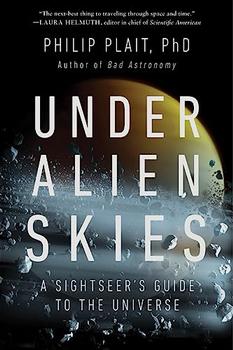Summary | Excerpt | Reviews | Beyond the book | Read-Alikes | Genres & Themes | Author Bio

The New Science of Planet Hunting in the Cosmos
by Lisa KalteneggerRiveting and timely, a look at the research that is transforming our understanding of the cosmos in the quest to discover whether we are alone.
For thousands of years, humans have wondered whether we're alone in the cosmos. Now, for the first time, we have the technology to investigate. But once you look for life elsewhere, you realize it is not so simple. How do you find it over cosmic distances? What actually is life?
As founding director of Cornell University's Carl Sagan Institute, astrophysicist Lisa Kaltenegger has built a team of tenacious scientists from many disciplines to create a specialized toolkit to find life on faraway worlds. In Alien Earths, she demonstrates how we can use our homeworld as a Rosetta Stone, creatively analyzing Earth's history and its astonishing biosphere to inform this search. With infectious enthusiasm, she takes us on an eye-opening journey to the most unusual exoplanets that have shaken our worldview - planets covered in oceans of lava, lonely wanderers lost in space, and others with more than one sun in their sky! And the best contenders for Alien Earths. We also see the imagined worlds of science fiction and how close they come to reality.
With the James Webb Space Telescope and Dr. Kaltenegger's pioneering work, she shows that we live in an incredible new epoch of exploration. As our witty and knowledgeable tour guide, Dr. Kaltenegger shows how we discover not merely new continents, like the explorers of old, but whole new worlds circling other stars and how we could spot life there. Worlds from where aliens may even be gazing back at us. What if we're not alone?
The writing is woven with many scientific terms but is delivered in a highly digestible format. Marvelous and revelatory, Alien Earths will get you excited for our burgeoning, promising efforts to reach cosmic life on Earth-similar exoplanets. So much has already been learned in just a few decades, and we're only getting started. Thanks to Dr. Lisa Kaltenegger and her fellow scientists, we are closer than ever to meeting life on another planet. It's only a matter of patience, perseverance, and time...continued
Full Review
 (727 words)
(727 words)
(Reviewed by Christine Runyon).
From the 17th century on, Johannes Kepler, Mary Shelley, Edgar Allan Poe, Jules Verne, HG Wells, and Edgar Rice Burroughs were just a few artists who contributed to a burgeoning awakening of the collective imagination, melding scientific and cosmic theories with myth and character, shaping something entirely new — science fiction.
How science fiction evolved from simple stories into a huge pop culture phenomenon could be an article unto itself. But it's worth noting that in 1966, science fiction was transformed forever when Star Trek premiered on NBC. In the show, the Starfleet organization was conceived with the goal of exploring and learning from our neighboring galaxies in the universe. Sound familiar? As it turns out, NASA was ...

If you liked Alien Earths, try these:

by Samantha Harvey
Published 2024
A slender novel of epic power, Orbital deftly snapshots one day in the lives of six women and men hurtling through space - not towards the moon or the vast unknown, but around our planet.

by Philip Plait
Published 2024
A rip-roaring tour of the cosmos with the Bad Astronomer, bringing you up close and personal with the universe like never before.
Finishing second in the Olympics gets you silver. Finishing second in politics gets you oblivion.
Click Here to find out who said this, as well as discovering other famous literary quotes!